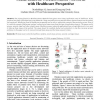135 search results - page 11 / 27 » Wireless Sensor Networks in Home Care |
177
click to vote
INFOCOM
2011
IEEE
14 years 5 months ago
2011
IEEE
—For energy conservation, a wireless sensor network is usually designed to work in a low-duty-cycle mode, in which a sensor node keeps active for a small percentage of time durin...
124
Voted
PERCOM
2005
ACM
15 years 7 months ago
2005
ACM
Towards the wide acceptance of ubiquitous networking, practical and deployable ubiquitous applications must be provided in a concrete and easily understandable form to end-users. ...
103
click to vote
IPPS
2007
IEEE
15 years 8 months ago
2007
IEEE
Wireless sensor networks are small, inexpensive and flexible computational platforms, that have found popular applications in various areas including environmental monitoring, he...
134
Voted
IAJIT
2011
14 years 8 months ago
2011
: The recent advances in Wireless Sensor Networks have given rise to many application areas in healthcare. It has produced new field of Wireless Body Area Networks. Using wearable ...
132
Voted
COMCOM
2006
15 years 1 months ago
2006
Recent technological advances in sensors, low-power integrated circuits, and wireless communications have enabled the design of lowcost, miniature, lightweight, and intelligent ph...

